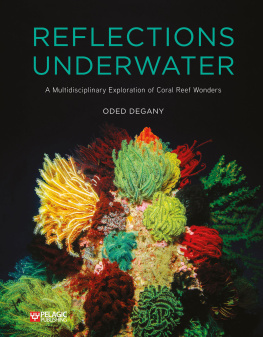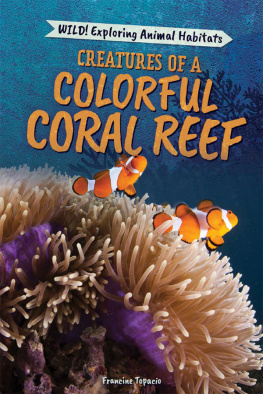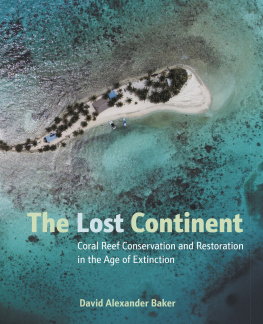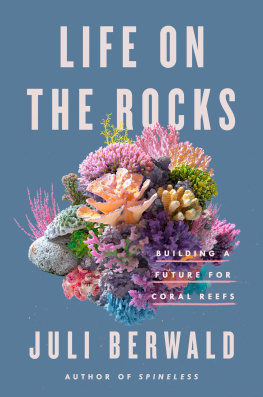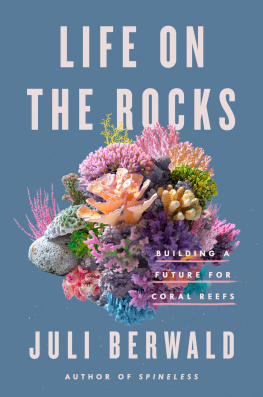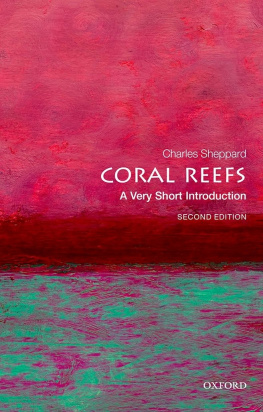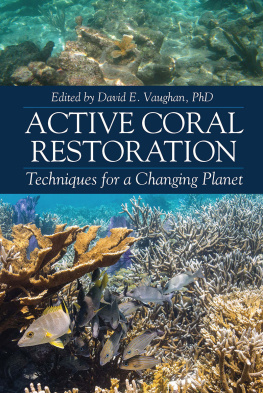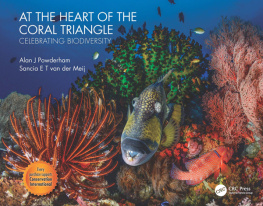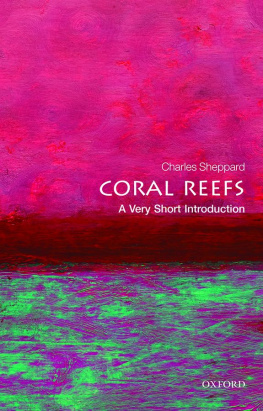CORAL REEFS
Coral Reefs
Majestic Realms under the Sea
PETER F. SALE

Published with assistance from the foundation established in memory of Amasa Stone Mather of the Class of 1907, Yale College.
Copyright 2021 by Peter F. Sale.
All rights reserved.
This book may not be reproduced, in whole or in part, including illustrations, in any form (beyond that copying permitted by Sections 107 and 108 of the U.S. Copyright Law and except by reviewers for the public press), without written permission from the publishers.
Yale University Press books may be purchased in quantity for educational, business, or promotional use. For information, please e-mail (U.K. office).
Set in Electra type by Integrated Publishing Solutions.
Library of Congress Control Number: 2020947101
ISBN 978-0-300-25383-2 (hardcover : alk. paper)
A catalogue record for this book is available from the British Library.
This paper meets the requirements of ANSI/NISO Z39.48-1992 (Permanence of Paper).
For my mentors, my colleagues, and all those students who helped me learn to appreciate coral reefs;
For my family, Donna, Darian, Michelle, and especially Isabelle, who will get to see how the Anthropocene pans out;
And most of all for the coral reefs themselves, which gave me a place and a reason to be.
CONTENTS
ONE
Beginnings
TWO
Serendipity in Deep Time
THREE
Ever Wonderful, Always Different
FOUR
So Many Ways of Being
FIVE
Exuberant Richness
SIX
Wonderful Surprises: How Do Coral Reef Communities Assemble?
SEVEN
How Nemo Found His Way Home
EIGHT
Wondrous Reef Chemistry
NINE
What Good Is a Coral Reef?
TEN
Why Dont We Seem to Care about Coral Reefs?
ELEVEN
Weve Left the Holocene
TWELVE
Coral Reefs in the Anthropocene
PREFACE
I n April 1999, I was in Fort Lauderdale, Florida, attending a scientific conference hosted by the newly formed National Coral Reef Institute at Nova Southeastern University. About five hundred coral reef scientists were gathered to explore the science of assessing, monitoring, and restoring coral reefs. There were the usual plenary talks, contributed papers, and lively poster sessions, where enthusiastic students and professors display posters describing their current research and try to entice other participants with their elevator pitches: My work is really exciting because .
Poster sessions are great times for conversation, about the posters and about a host of other topics. The coral reef science community is a widely scattered but closely knit community of colleagues, collaborators, and friends. In the best conferences (and this was one) the conversations are helped along by a liberal supply of alcohol and snacks. I dont remember my paper, or much else about that conference, but I do remember those conversations, because so many of them centered on the circumtropical bleaching event that had just ended late the year before.
A mass bleaching event is a rapid and conspicuous change on a reef, caused by physiological stress being experienced by the corals. The stress leads to a breakdown of the most important symbiotic relationship on reefs, that between the corals and their microscopic algal symbionts. The algal cells (hundreds of thousands to millions per square centimeter of coral tissue) are pigmented, and as they are expelled the coral turns a ghostly white. This can happen overnight. In 19971998, during the then strongest El Nio event on record, coral reefs had turned white around the world. It was the first time bleaching had occurred on such a massive scale. Over the weeks after bleaching, many of those corals had died, and there were reports of reefs in all oceans that had suffered extremely high die-offs of coral. The Fort Lauderdale conference was the first opportunity many of us had to talk with colleagues who had witnessed this destruction. We all understood the seriousness of what had happened, and I remember that we all anticipated that a signal as conspicuous as what had just occurred would surely be a sign to the world that we had to deal with climate change, and quickly. We found that expectation comforting. Except that it did not happen. Most of the world just did not care.
This situation is deeply unfortunate, because as well as being ecologically and economically valuable ecosystems, coral reefs are a supremely magnificent feature of our planet, majestic oceanic realms with amazing stories to tell. Their stories can bring pleasure, open us to new perspectives, and delight our minds and senses while revealing intricacies in the way this world we inhabit is assembled. Reefs offer stories of sublime beauty and of great power, as well as stories that can help us understand our current predicament as we alter our world in ways that will do harm to us and those we love. Remembering the conversations in Fort Lauderdale, I knew I needed to write, because I believe we need those stories. This book is about coral reefs and what they say to me. It is also about what is happening to reefs, about why, and about what this says about us. But it is mainly about what reefs are and how we need to appreciate them.
Why need and appreciate? I say need because I am convinced that humanity must relearn something most of us have long forgottenthat we are a part of the biosphere on this planet, not external to it. Connecting with natural ecosystems can help us do that, and reefs offer many ways in which we can connect. I say appreciate because, despite being regularly deluged with stunning images, evocative videos, and detailed descriptions in the media and all over the web, we remain largely ignorant of what reefs are or why they are worth caring about at all. Reefs are part of the Other, not part of our world, and one brief snorkel tour during a beach vacation doesnt build an emotional connection. My goal is to get at least some few more of us to know reefs a whole lot better. Only by knowing them better will we truly understand the important messages they bring. Understand, and care about, those reefs and their messages. Appreciate them.
Despite having been around for a very long time, coral reefs are perhaps the most sensitive of all ecological systems, easily disrupted or destroyed by changing circumstances or human action. Coral reefs are being very substantially altered by the stresses we are causing today. In 2011, I detailed this story in Our Dying Planet, stating that by 2050 coral reefs as I knew them in the late 1960s will simply not be present anywhere on this planet.
Think what that statement means. I wasnt saying that some coral reefs will be degraded. I was saying that all coral reefs could be lost. Its like saying that all rain forests around the world will soon be pastures. We have never yet had that profound a global impact on any major ecosystem, yet we could eliminate coral reefs in just three more decades! I still fear that. There remains a vanishingly small window of opportunity for us to alter our behavior, reduce the impacts we are having on the planet, and help a few lucky reefs to persist and maybe to flourish, but we show little sign of wanting to take advantage of that window.
I was not the first reef scientist to warn of the loss of coral reefs. One of the plenaries at that 1999 conference was titled, Is It Time to Give Up? It was subsequently published (R. W. Buddemeier,
Next page

